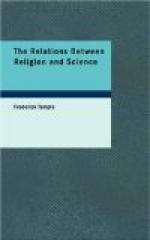To conclude, the doctrine of Evolution leaves the argument for an intelligent Creator and Governor of the world stronger than it was before. There is still as much as ever the proof of an intelligent purpose pervading all creation. The difference is that the execution of that purpose belongs more to the original act of creation, less to acts of government since. There is more divine foresight, there is less divine interposition; and whatever has been taken from the latter has been added to the former.
Some scientific students of Nature may fancy they can deduce in the working out of the theory results inconsistent with religious belief; and in a future Lecture these will have to be examined; and it is possible that the theory may be so presented as to be inconsistent with the teaching of Revelation. But whatever may be the relation of the doctrine of Evolution to Revelation, it cannot be said that this doctrine is antagonistic to Religion in its essence. The progress of Science in this direction will assuredly end in helping men to believe with more assurance than ever that the Lord by wisdom hath founded the earth, by understanding hath He established the heavens.
LECTURE V.
REVELATION THE MEANS OF DEVELOPING AND COMPLETING SPIRITUAL KNOWLEDGE.
The evolution of Knowledge. Does not affect the truth of Science. Nor of Religion. Special characteristic of evolution of Religious Knowledge, that it is due to Revelation. All higher Religions have claimed to be Revelations. The evolution of Religious Knowledge in the Old Testament; yet the Old Testament a Revelation. Still more the New Testament. The miraculous element in Revelation. Its place and need. Harmony of this mode of evolution with the teaching of the Spiritual Faculty.
LECTURE V.
REVELATION THE MEANS OF DEVELOPING AND COMPLETING SPIRITUAL KNOWLEDGE.
’God, who at sundry
times and in divers manners spake in time past
to the Fathers by the
Prophets, hath in these last days spoken to
us by His Son.’
Hebrews i. 1.
The doctrine of Evolution has been applied not only to the formation of all created things, but to the development of human knowledge; and this with perfect justice, though with some risk of misunderstanding. It is certain, and, indeed, it is obvious, that knowledge grows. The ordinary experience of mankind becomes larger and clearer in the course of time, and the systematised experience which we call Science makes the same progress in still greater measure and with more assurance.




